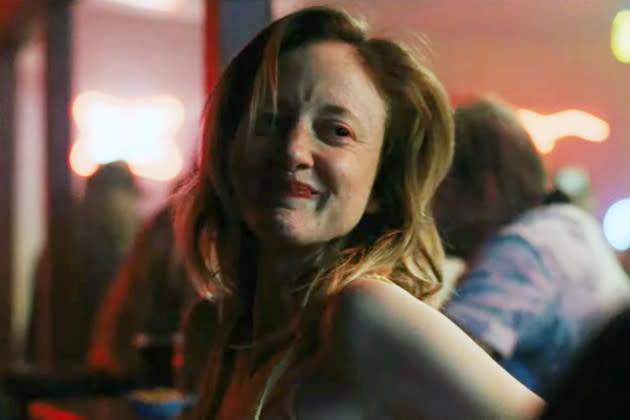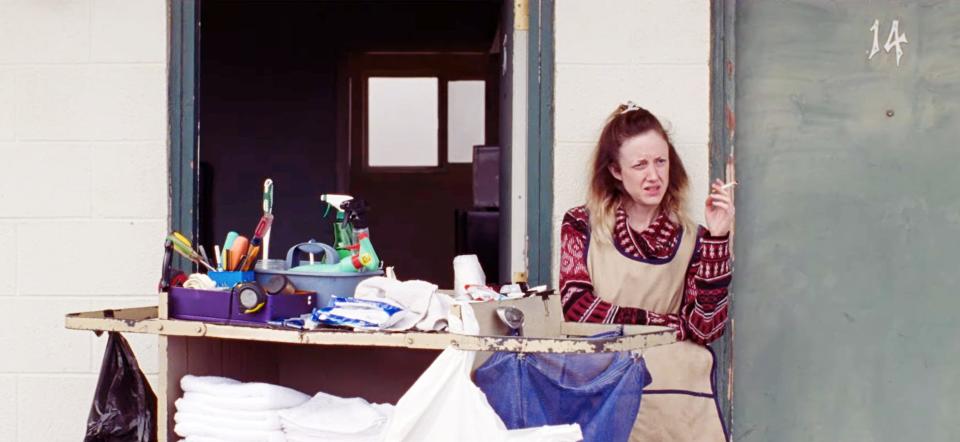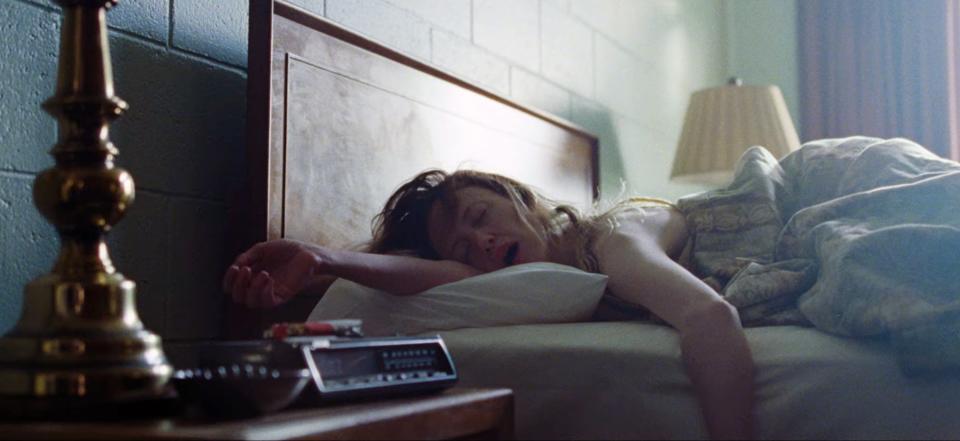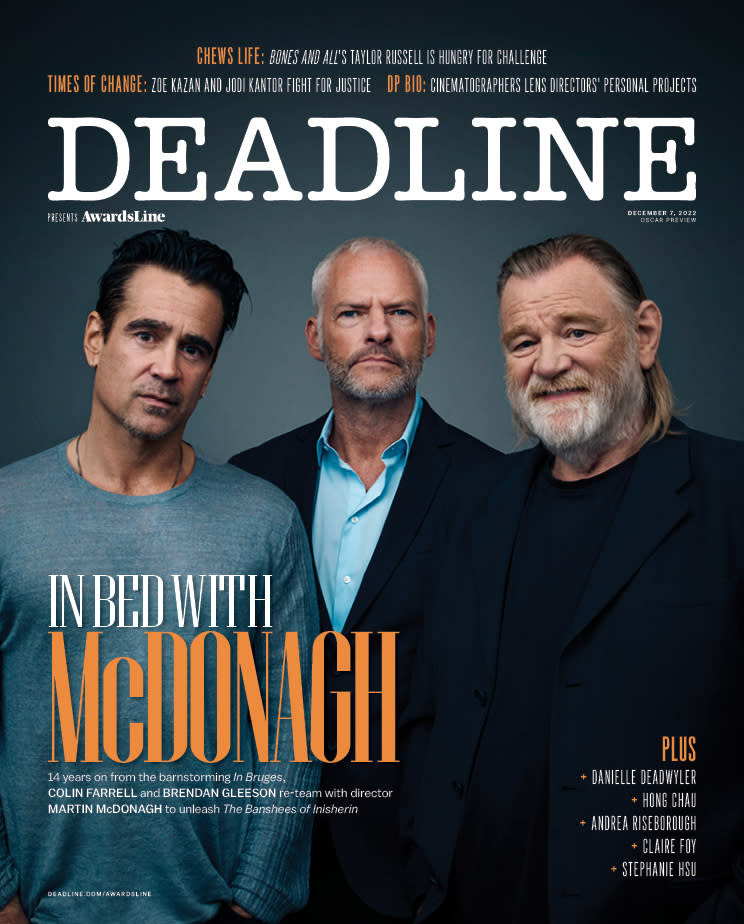‘To Leslie’ Star Andrea Riseborough On Building Camaraderie With The Audience … And Avoiding “Anything That’s Particularly Careful”
- Oops!Something went wrong.Please try again later.
- Oops!Something went wrong.Please try again later.

Andrea Riseborough’s acclaimed performance as the title character in To Leslie might be something of an underdog this season, but a recent Independent Spirit Award nomination for the actress suggests it is finding its audience, and that the plaudits are well-deserved. Directed by Michael Morris, the film tells the story of a woman struggling with an addiction to alcohol, a decade after winning — and promptly wasting — a small fortune in the state lottery. As she struggles to find her feet, her resolve is strengthened by her love for her son James (Owen Teague), with whom she’s desperate to reunite.
DEADLINE: Charlize Theron hosted a screening of To Leslie at CAA a few weeks back. What was that experience like for you?
More from Deadline
ANDREA RISEBOROUGH: It was so wonderful. Two things. First, and I think this is bigger than just that screening, is this feeling of real complicity among the audience. Everybody slowly starts to recognize that they’ve felt what Leslie feels. This strange sort of honesty or awakening happens in the audience, and camaraderie comes from that. The second thing is that the narrative is so subtle in the way it’s presented. There are huge periods of movement, breath and visual cues to enjoy. And Michael fearlessly committed to those. So, it’s a wonderful thing to step into a completely different realm for a time, and I don’t think films like this exist much these days. We shot it in 19 days, all on film, and the feeling you get from that ignites people into being reminded what an intimate experience cinema can be.
DEADLINE: The film is autobiographical for the screenwriter, Ryan Binaco. Did it feel to you like a complete portrait because of that?
RISEBOROUGH: When any of us look back at our lives a decade on, we recognize that we’re cellularly different people. And there will be things we recognize about ourselves and things we don’t. For Leslie, it’s the unchanging parts that she struggles with most, and as wild and free as she is — as much of a truth-teller as she is — she’s still trapped in her victimhood. Watching someone so vivacious become trapped by that is quite an unusual experience. It’s not presented in the film apologetically, and that’s unique. Michael and I talked a lot about the notion of Leslie as a female anti-hero, which is not an idea film has focused on much.
The story isn’t presented in a linear way, narratively, and because of that, you’re afforded the ability to hold understanding for both periods of Leslie’s life because they’re presented right next to each other, but distant from one another. So often a film gives you all the answers before you’ve even asked the questions, but here it’s about trying to understand how Leslie has lost her compass, and how the one true direction — her North Star — is her son.
I think all of those things hold because it’s based on a true story. It’s written from the perspective of a child who watched their mother experience this very same thing. It’s as if Ryan has given his mother, who was from a very different place and background, a chance at redemption. What’s important about the story is that it’s this that makes the film so beautifully hopeful, but Leslie isn’t just set free as a mechanism for the storytelling. The film doesn’t rely on her being redeemed. She will continue to pull out a bottle and put it away for the rest of her life. It’s a realistic depiction of what the aftermath of that maelstrom looks like.

DEADLINE: What did you make of how the film handles the complicated highs and lows of her dependence on alcohol?
RISEBOROUGH: Watching the film, some of the moments you feel closest to Leslie are those ones where she’s happy. There’s an honesty to having her turn to drink in moments of happiness, because that’s the most human reflex. “I’m happy, I want to celebrate. I want to be even happier.” Happiness is such a transient beast for all of us.
Nobody chooses to be an addict, and it doesn’t matter whether it’s nature or nurture that pushes them there when there’s clearly no choice in the matter. I think one of the things that the film inspires is a feeling in the audience about their own relationship to addiction, either their own or people they care about, because you feel so desperately for Leslie’s son, and for Leslie’s disappointment in herself that she can’t be the mother she wants to be.
It stirs up all those feelings in us where, time and time again, despite knowing better, we attempt to save someone, or save ourselves, and it really feels like it’s going to be possible. Mark Maron’s character, Sweeney, embodies that. He knows he can’t fill that hole inside of Leslie, but he can’t stop himself from trying. It’s a natural compulsion to protect those we love from the wreckage of their own behavior.
DEADLINE: Process is ethereal, but are you able to rationalize the work you put in to find a character like Leslie? Are there tangible steps to creating a character for you?
RISEBOROUGH: I think there were two years before we got to the shoot. Michael had sent the script to me and expressed that he wanted us to do it together. The character, then, just starts to sink in. I’ve just played Audrey Withers in a film about Lee Miller, who was a model who became a war correspondent for Vogue during the Second World War. And when you look at Lee Miller’s photographs from Dachau, you can’t unsee them. There are things that once you’ve witnessed you can’t unsee. I think it’s the same with any character, and with any expression of truth, really. Leslie lived with me for quite some time, and you start to build a life for her.
She’s a woman from a very different place, which helps. Michael honed in on Texas, which felt right in every way, and expansive and conflicted. The way Leslie is, she reflects her state in many ways. And then we really narrowed it down into the specifics: I mapped out what her life would be, and those tools come from having trained, and from having worked with the most extraordinary directors.
But I think, no matter what you do, if you’re unable to fully commit yourself to telling the story, it just isn’t going to work. I’m brutally honest about the many wonderful and sordid and complicated ways that people behave, and how I want to reflect that. That’s what I’m looking for in terms of feeling satisfied as an actor, and it’s those qualities I gravitate towards in all of my favorite performances from others. I’m not particularly interested in anything that’s particularly careful, which is not to say that’s not valuable. It’s just not my approach. I think that’s a received way of performing, and it’s not necessarily an accurate reflection of human nature.

DEADLINE: Do you feel you carry the weight of a character like Leslie when you’re off the set, or are you able to compartmentalize?
RISEBOROUGH: There are probably different reviews on that [laughs]. My partner would say that he’s very ready to be done with certain characters when I finish some of them, and sometimes afterwards as I try to finish processing them posthumously. But I think, for the most part, I really try to enjoy my life. I do enjoy life, and I really enjoy people, and engaging with them as much as possible. A character can’t help but have an effect, but I do think I have a muscle that has become more refined over the years of holding them at arm’s length. I can slip in and out of characters relatively quickly and easily, and it doesn’t make the experience any less deep. The dive, I think, might actually be deeper because you feel safer to know that you will emerge.
DEADLINE: As well as To Leslie, you’re also currently starring in Matilda the Musical. It’s a project that’s full of joy, though your Mrs. Wormwood is quite a creation.
RISEBOROUGH: Doing that was so much fun. I’ll tell you what wasn’t fun, though, and that was shouting at poor Alisha Weir, who plays Matilda. I think I apologized to that poor child at the end of every take, because of course Matilda just has such a raw deal.
But conjuring the life of the Wormwoods was just so much fun, and there was actually a big song-and-dance number that’s not in the film that I think we worked on for four or five months. So, there was dancing and singing and joy and colors — so many colors — and Matthew Warchus, who runs the Old Vic theater, is such a wonderful director who comes from the same world I do. There were a lot of theater-driven performers in the cast.
Also, I’d like to say that my favorite line of dialogue — and I don’t even know if it has made the final cut — is this one: “We’ll have a television in every room, just like Madonna!” I hope that wasn’t cut [laughs].

DEADLINE: Has it given you an appetite for more musicals?
RISEBOROUGH: I’m a trained singer and dancer, both classical, so just being able to explore that again was fun. I’m so pleased it’s coming to me now — though my splits might have been better 15 years ago — because I knew earlier on in my career that it wasn’t a direction I wanted to commit to. It wouldn’t have been right for me then, even though I was as capable of doing those things as I was at drama.
So often, as a performer, you have to choose whether to go down one road or another, which is a strange thing when you’re capable of both, but certainly literature had driven me, and so had classical music, more so than musical theater. But when you’re working with someone like Tim Minchin, who makes it such a joy, it almost feels illegal to get to be so cheeky at work.
Best of Deadline
Sign up for Deadline's Newsletter. For the latest news, follow us on Facebook, Twitter, and Instagram.

